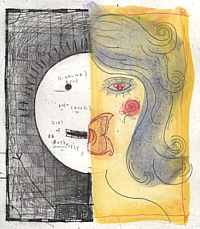
|
|
NOVEMBER 1998 CONTENTS
|
In a Manner of Speaking
By "Guido Veloce"
Illustration by Bruno
Paciulli

The signs had been there all along. From elementary school through college, it was clear that I was terrible with metaphors, simile, and poetry. That should have been the tip-off, but, being literal-minded, I just thought I was terrible with metaphors, simile, and poetry. In literature classes, I was the kid who wanted to know what kind of rude beast W. B. Yeats had slouching toward Bethlehem--I mean, like Godzilla? What were people there going to do about it? I even had problems with music I liked and still like: there is no way you're going to get to the moon on gossamer wings, for instance. Any fool knows that. The music of the '60s posed special difficulties for us literal-minded folk, Bob Dylan above all. "Warehouse eyes" and "mercury mouth" totally baffle me to this day, while my peers grasped those concepts immediately, or at least said, "Oh, wow." Literal-mindedness probably explains why, in the great cultural divide of that decade, some of us came down on the side of the Rolling Stones rather than the Beatles. Even after having the drug reference explained to me, I couldn't conjure "Lucy in the Sky with Diamonds." On the other hand, "I Can't Get No Satisfaction" was all too clear and relevant.
This belated bit of self-awareness leads me to move beyond my own particular affliction to divide humankind into literals and figuratives. The former hear words as they sound, no matter how absurd. The latter allow for a certain artistic looseness with language. A candidate for local office, for instance, has billboards with the slogan "Eighteen years experience with integrity." Either he is a figurative, or we finally have a recovering politician.
I probably would never have realized that I am a literal if I hadn't recently become part of a family with a large number of figuratives, who allow some slippage between words and meaning. Its members answer questions like, "Do you want to meet for dinner?" with "We could do that." When I first heard that phrase, I, as a literal, thought it meant "we could do that, or we could do something else" instead of what was really meant, which was "yes." It took a while longer to realize that, in other contexts, "we could do that" can also mean "no." Not to grasp the point marked me as completely obtuse. On the other side of the coin, I began to sympathize with the daughter of friends, long the butt of family jokes, who suddenly seemed like a soul mate. If Mom said, "Put the roast in the oven at 4," she put the roast in the oven at 4. Heaven help dinner guests when the instructions did not include "Turn on the oven." She is now a state auditor.
I am not saying these things to justify my own condition or to bash figuratives. We both have our place. You want one of us literals around when you are lost and need directions. On such occasions, "Turn left in 2.5 miles" trumps "somewhere over the rainbow." You don't want us writing copy for greeting cards-- "You look good" and "Hope you get better" pretty much define the limits of our imagination. The worst fate Jesse Helms could wish on the arts, in fact, would be to put us in charge. In a world without figuratives there would be no poetry, computer manuals, or Ireland.
Indeed, if I could chose to be one or the other, I would be a figurative, mostly because they seem to understand each other while literals can even drive other literals crazy. A case in point is our ongoing long-distance dealings with the California health care system, Medi-Cal, which appears to have a form for every case except the one under consideration, and a required answer for every inapplicable question. Overseeing these rules and regulations (in our experience, at least) are social workers whose literal-mindedness inspires awe, even from an Alpha literal like me. It has been chastening to deal with a system that insists on making sure a bed-ridden, barely lucid 93-year-old woman is fully informed about contraception and reproductive rights. It is enough to drive me to metaphor.
In the course of this journey of self-discovery, however, I learned two things less personal and more profound about literals and figuratives. Figuratives probably function better in the real world than we literals do. They see a sign like "Slow Children Ahead" and cut their speed. We get confused, keep sailing along, and get tickets. The second great insight, and possibly the basis of that ever elusive, fortune-making pop psychology book, is that in common with other groups capable of infuriating each other--notably parents and teenagers, and men and women--literals and figuratives tend to cohabit.
"Guido Veloce" is a Johns Hopkins University professor.
RETURN TO NOVEMBER 1998 TABLE OF CONTENTS.